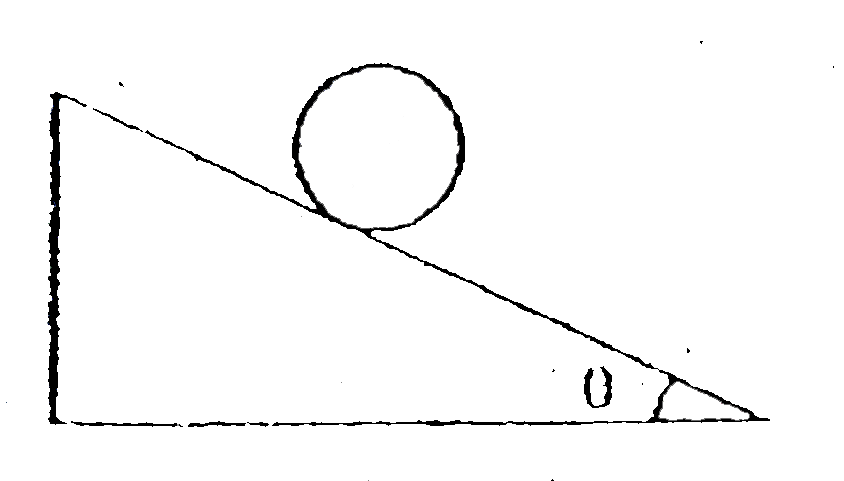A body is rolling down an inclined plane. Its acceleration will not depend on the following:
inclination of the plane.
gravitational acceleration.
radius of gyration.
length of the inclined plan
The correct Answer is:D
To solve the problem, we need to analyze the factors that affect the acceleration of a body rolling down an inclined plane. We will break down the steps involved in understanding the relationship between the various parameters and the acceleration of the body.
1. Understanding the Forces Acting on the Body:
- When a body rolls down an inclined plane, the forces acting on it include gravitational force (mg) acting downwards and the component of gravitational force along the incline (mg sin θ).
- The normal force acts perpendicular to the incline but does not affect the motion along the incline.
2. Identifying the Acceleration:
- The acceleration of the body can be derived from Newton's second law. The net force acting along the incline is mg sin θ, which causes the acceleration.
- The equation for acceleration (a) can be expressed as:
a=mgsinθm+IR2
- Here, I is the moment of inertia of the body, and R is the radius of the body.
3. Analyzing the Dependencies:
- From the equation, we can see that:
- The acceleration (a) is directly proportional to g (gravitational acceleration).
- The acceleration (a) is also directly proportional to sinθ (the angle of inclination).
- The acceleration is dependent on the moment of inertia (I) and the radius (R) of the body.
4. Identifying What It Does Not Depend On:
- The key point is that the acceleration does not depend on the length of the incline. The length of the incline affects the distance traveled but does not influence the acceleration down the incline.
- Therefore, the acceleration of the body rolling down the incline is independent of the length of the path.
5. Conclusion:
- Based on the analysis, the acceleration of a body rolling down an inclined plane will not depend on the length of the incline. Thus, the correct answer is that the acceleration will not depend on the length of the incline.
Final Answer:
The acceleration of a body rolling down an inclined plane will not depend on the length of the inclined path.
---
- When a body rolls down an inclined plane, the forces acting on it include gravitational force (mg) acting downwards and the component of gravitational force along the incline (mg sin θ).
- The normal force acts perpendicular to the incline but does not affect the motion along the incline.
- The acceleration of the body can be derived from Newton's second law. The net force acting along the incline is mg sin θ, which causes the acceleration.
- The equation for acceleration (a) can be expressed as:
a=mgsinθm+IR2
- Here, I is the moment of inertia of the body, and R is the radius of the body.
- From the equation, we can see that:
- The acceleration (a) is directly proportional to g (gravitational acceleration).
- The acceleration (a) is also directly proportional to sinθ (the angle of inclination).
- The acceleration is dependent on the moment of inertia (I) and the radius (R) of the body.
- The key point is that the acceleration does not depend on the length of the incline. The length of the incline affects the distance traveled but does not influence the acceleration down the incline.
- Therefore, the acceleration of the body rolling down the incline is independent of the length of the path.
- Based on the analysis, the acceleration of a body rolling down an inclined plane will not depend on the length of the incline. Thus, the correct answer is that the acceleration will not depend on the length of the incline.
The acceleration of a body rolling down an inclined plane will not depend on the length of the inclined path.
Topper's Solved these Questions
- SYSTEM OF PARTICLES AND ROTATIONAL MOTIONBOOK - VMC MODULES ENGLISHCHAPTER - SYSTEM OF PARTICLES AND ROTATIONAL MOTIONEXERCISE - ENABLE
50 Videos
- SYSTEM OF PARTICLES AND ROTATIONAL MOTIONBOOK - VMC MODULES ENGLISHCHAPTER - SYSTEM OF PARTICLES AND ROTATIONAL MOTIONEXERCISE - EFFICIENT
50 Videos
- SYSTEM OF A PARTICLES & ROTATIONAL MOTIONBOOK - VMC MODULES ENGLISHCHAPTER - SYSTEM OF A PARTICLES & ROTATIONAL MOTIONEXERCISE - IN-CHAPTER EXERCISE F
10 Videos
- UNITS, MEASUREMENTS & ERRORSBOOK - VMC MODULES ENGLISHCHAPTER - UNITS, MEASUREMENTS & ERRORSEXERCISE - IN - CHAPTER EXERCISE - B
10 Videos
Similar Questions
Knowledge Check
A body is rolling down an inclined plane. If kinetic energy of rotation is 40% of kinetic energy in translatory state then the body is a.
AringBcylinderChollow ballDsolid ball
A solid cylinder is rolling down a rough inclined plane of inclination θ. Then
View SolutionA container containing a liquid is moving down an incline plane with constant acceleration 'a' . The angle made by the water surface in equilibrium with the inclined plane is

View SolutionA cylinder is rolling down a rough inclined plane. Its angular momentum about the point of contact remains constant. Is this statement true or false?
View SolutionThe acceleration of a body rolling down on an inclined plane does not depend upon
View SolutionIf a solid cylinder rolls down an inclined plane, then its:
View SolutionA thin uniform circular ring is rolling down an inclined plane of inclination 30∘ without slipping. Its linear acceleration along the inclined plane will be
View SolutionA thin uniform circular ring is rolling down an inclined plane of inclination 30∘ without slipping. Its linear acceleration along the inclined plane will be
View Solution

